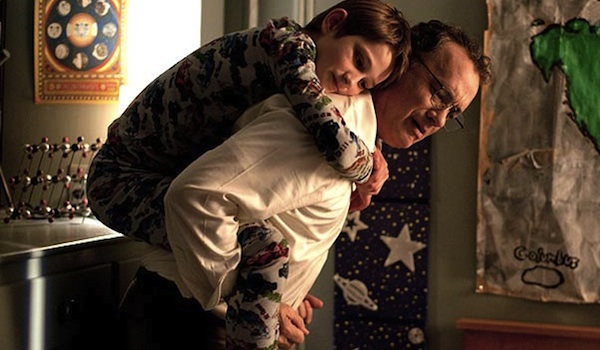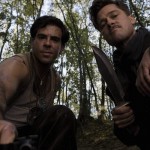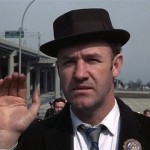Extremely Loud and Incredibly Close Review
Stephen Daldry’s latest film, Extremely Loud and Incredibly Close, tries to make sense of one of the worst days—perhaps the “Worst Day”—in American history. It does so through the eyes of a pre-teen boy, who appears to suffer from Asperger’s Disease. And what does it ultimately tell us? That New Yorkers are kind and resourceful people? That hands-off parenting is the best way for a child to get through an emotional crisis? That it’s OK to go on the swings? Yes, Daldry’s film is based on novel—a beloved one by Jonathan Safran Foer. But perhaps the biggest truth to be gleaned from its cinematic interpretation is that not everything on the page needs to make its way onto the screen.
The film is just a quagmire of devices and dialogue that sound so literary, they’ll make your eyes roll, your head spin, and sometimes, your blood boil. Oskar Schell (Thomas Horn) is our protagonist. A bright boy, he spends his time on “reconnaissance expeditions,” which send him all over New York to solve something, like the mystery of the city’s mysterious sixth borough. His father, Thomas (Tom Hanks), encourages these missions—he even sets many of them up—in order to get Oskar to come out of his shell a little more. But before Oskar can solve the mystery of the sixth borough, two planes are flown into the World Trade Center, taking his father, his best friend, away from him.
Flash forward about a year, and both Oskar and his mother, Linda (Sandra Bullock), are still grieving. Oskar holes up in a crawlspace where he secretly keeps the family’s old answering machine with messages from his dad in the tower on 9/11. No one, not even his mother, knows these messages exist. One day, he musters up the courage to go into his father’s closet, where he finds a key hidden in a vase. It’s in an envelope with the word “Black” on it. Convinced “Black” is referring to a person and that the key will hold some clue to his father’s death, he scours the New York phone books for people with that last name. And after mapping his journey out, and putting into motion all the lies necessary to keep his mother out of his hair, Oskar begins looking for the lock his key belongs to.
The film’s problems are manyfold, and ultimately, the vast majority of them lead back to Eric Roth’s screenplay. Though he’s written many fine films, including The Curious Case of Benjamin Button (one of my favorites from the last decade), his work here is almost unforgivable. It’s as if no consideration was given to make Extremely Loud and Incredibly Close subtler or more cinematic. The shifts in tone from Oskar’s very idealistic, almost fairy-tale-like quest to his discussions about death and his obsession with photos of men jumping from buildings is jarring to say the least. And the way he speaks is indescribably irritating. There are his quirks—like how he spews random facts while seeming like he’s on speed. But there are also phrases that might seem OK in print but just don’t translate well to film dialogue. He calls 9/11 “The Worst Day.” He says of his quest that he’s doing it so he can “extend his eight minutes” with his dad, a reference to a fact his annoying voiceover shares with us about the sun dying out. It just all seems so inauthentic and took me out of the film very early on.
It doesn’t help that Oskar just seems like a thorn in your side. He’s quite intrusive and more than a little rude (he goes so far as to say he wishes his mom was in the towers instead of his dad…to her face). But I don’t blame Thomas Horn, the young Jeopardy! contestant plucked from obscurity to portray the character, though it’s not like he does exceptional work or anything. No, the blame still belongs to Eric Roth, who manages to make an 11-year-old with a mental disorder whose father was killed on 9/11 feel completely unsympathetic.
Stephen Daldry’s direction is no better than Roth’s writing. He doesn’t really grasp the concept that 9/11 imagery isn’t something one needs or wants to be hammered over the head with—especially when it’s digitally altered to show Tom Hanks falling from a building. Really, there are moments in this film so tasteless that I couldn’t believe what I was watching, others so obvious that I couldn’t fathom how this guy earned three Oscar nominations for directing. Being pretty lukewarm on at least two of his previous features, I have generally lukewarm expectations for a film of his. I know now that if he tries to tackle another historical tragedy, I’ll stay home.
On the acting front, there aren’t really any performances worth writing home about. Viola Davis and Jeffrey Wright play Abby and William Black, a separating couple who are the first people Oskar meets on his quest. Both are great, though they only get a scene or two each. Max Von Sydow, of course, earned the film’s sole Oscar nomination outside of Best Picture. He plays a mute known as The Renter, and after a while, he becomes Oskar’s closest confidant. I liked Von Sydow in the role, though it’s not one I’d call challenging. He was much better a few years ago in The Diving Bell and the Butterfly, and I’d say all four of his fellow Best Supporting Actor nominees outdo him this year. Still, for a film with so few positives, his presence is welcome.
Tom Hanks is present mainly via flashbacks, but he doesn’t do anything surprising or challenging. Ditto Sandra Bullock who has maybe just three scenes. Her lack of screentime shocked me, though her pretty average performance wasn’t a major surprise. What was surprising, however, was the extraordinarily unorthodox parenting style hers and Hanks’ characters employ. Again, credibility was severely strained as we watch them act unphased while their son is galavanting around Central Park after dark. Especially after 9/11, one would think a little more caution would be taken.
Though it’s clear the film is aiming to wallop you with some emotion, its punches completely missed me. And though plenty of other reviewers agree, a decent chunk of Academy voters don’t, as the film became the worst-reviewed Best Picture nominee in many, many years. I know it’s the worst one I’ve ever seen. I didn’t really know what to expect going into Extremely Loud and Incredibly Close, but I definitely didn’t expect a film that was offensively bad, or one that would make me rethink the talents of nearly every person involved.
















